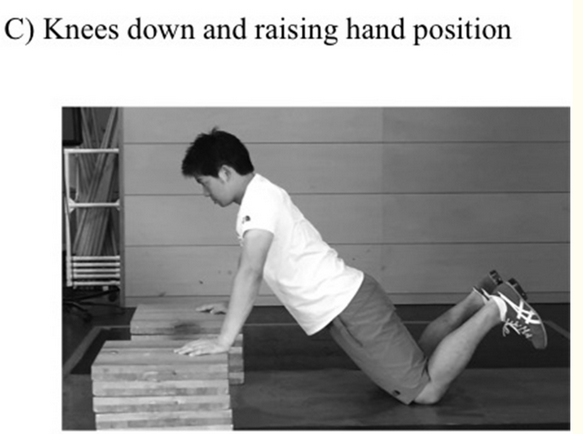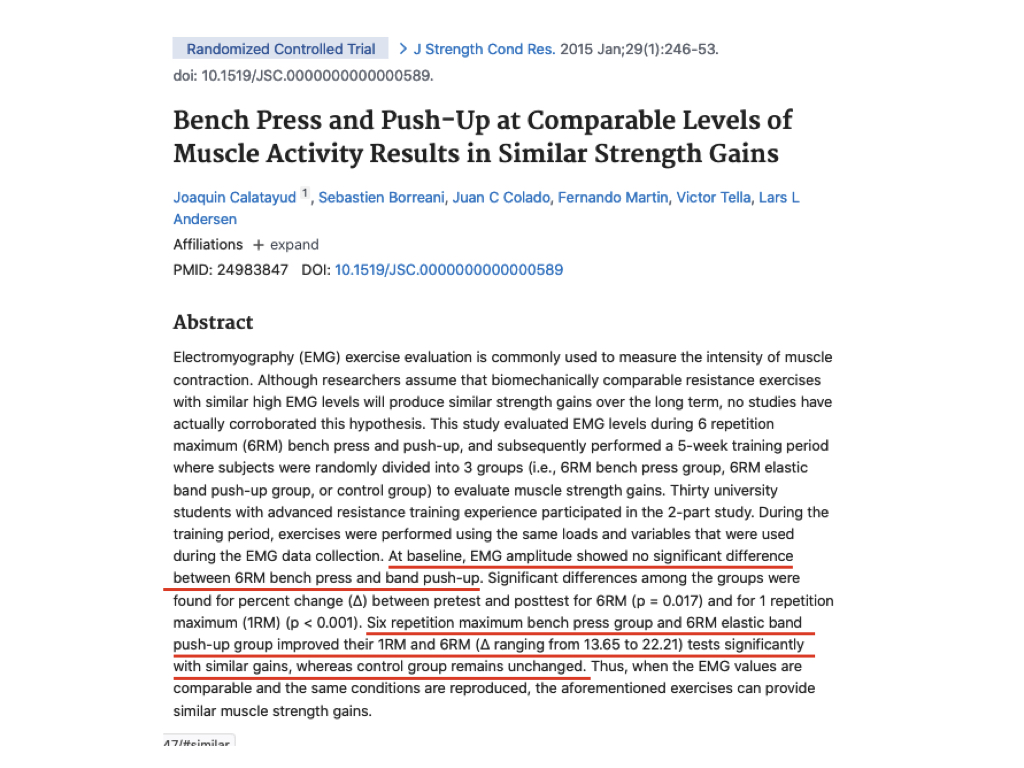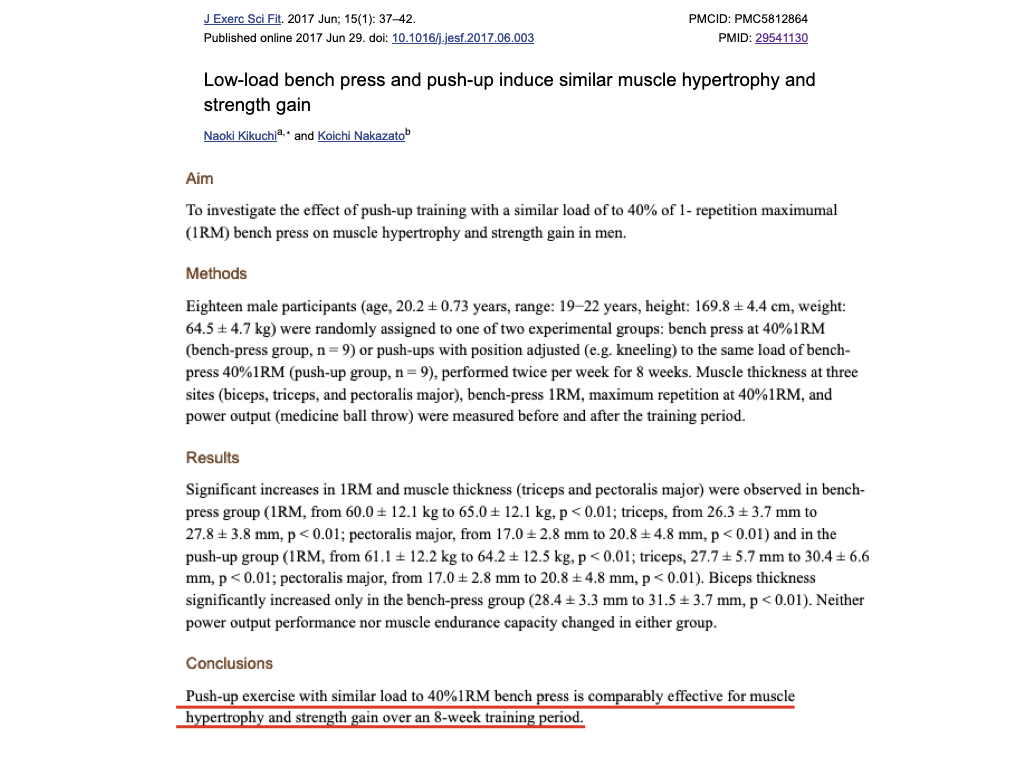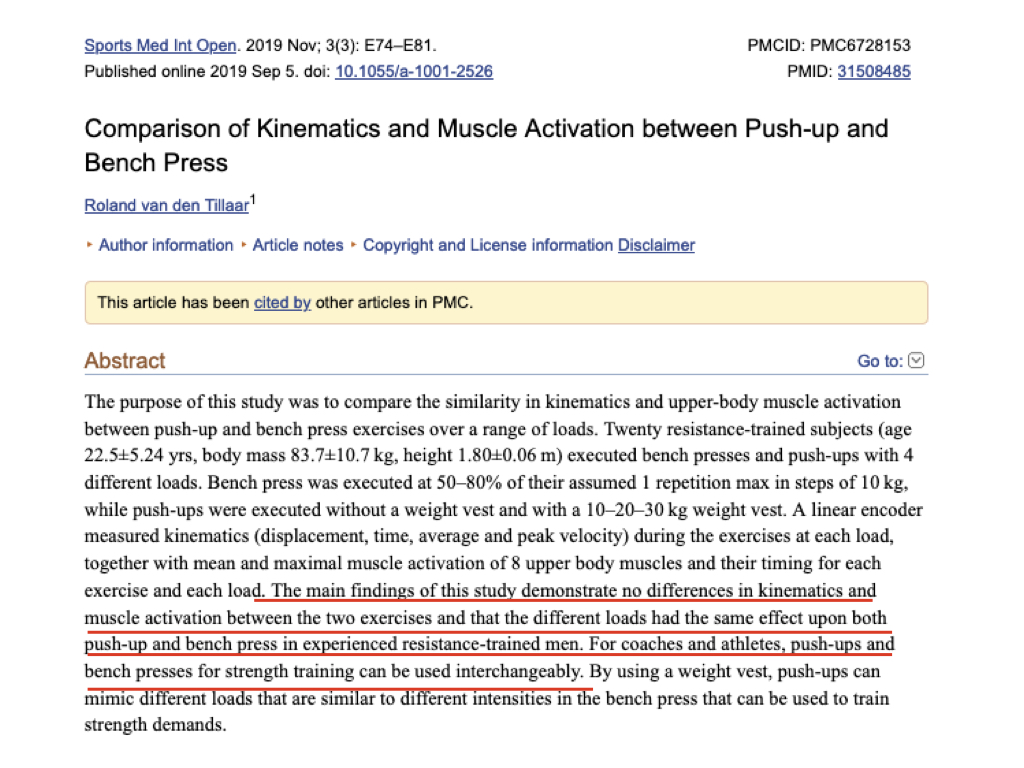Push Ups Vs Bench Press
Can you build as much upper body strength and muscle with push ups vs bench press?
Yes. Three separate studies have reported push ups are as effective as bench press for development of strength and muscle. In addition, the push up will provide more effective training for the “core” muscles, and very likely is safer than the bench press for the shoulders.
Loading With Push Ups vs Bench Press
A standard push up (legs extended, weight on hands and balls of feet) loads the pectorals, deltoid and triceps with about 65% of your body weight.
A push up on knees loads the upper body with about 49% of your body weight.
The major advantage of the bench press seems to lie in the ability to use very small loads – less than 49% of your body weight – if necessary to start.
I say “seems to lie” because it is in fact possible to scale push ups to almost any strength level. Simply, one raises the upper body, which results in more of body weight being borne on the feet. The photo below shows one set up for reducing the load on the upper body.

Photo from the 2017 Kikuchi study.
The hands are on stacks of what look like 1” wood boards. As strength increases one can remove one level of boards and by this route gradually increase the difficulty of the push up.
We can use the same process with the legs extended and weight on balls of feet. Further, we can use a weight vest such as the Kensui EZ-vest (affiliate link) to safely add load to push ups. Thus there really is no difference in scalability of push ups vs bench press.
Push Ups Vs Bench Press Studies
In 2015 Calatayud and colleagues compared push ups vs bench press at similar 6RM loads. One group trained 6RM push ups by using resistance bands to increase load, the other trained with the 6RM bench press. The study found that 6RM elastic band push ups and 6RM bench press training produced comparable strength and mass gains. I have developed a unique way to load push ups with Bodylastic bands using my DIY band platform.

The 2017 Kikuchi study of push ups vs bench press compared training with difficulty scaled push ups (on feet or knees) to training with the bench press with 40% 1RM; strength and hypertrophy outcomes were comparable for the push ups vs bench press.

The 2019 Tillaar study of push ups vs bench press found no differences in kinematic and muscle activation between bench press and push ups performed at various loads using a weight vest to adjust push up load.

Another advantage of push ups vs bench press is that push ups involve more "core" muscle activation and are probably safer than bench press for the shoulders due to push ups being a closed chain exercise with the hands fixed, resulting in less degree of freedom at the shoulder. In addition, in the bench press you lie on the shoulder blades, which reduces their mobility for protraction and retraction and consequently endangers the shoulder joint. Bench press is so frequently a cause of shoulder damage that “bench presser’s shoulder” is a recognized orthopedic disorder. During a push up your shoulders can freely protract and retract, which provides optimal biomechanics for horizontal pushing, and protects against shoulder injury.
Additionally, the bench press presents a risk of dropping a heavy bar on the chest or neck, which can severely injure or even kill you. One can find many examples of bench press gone awry on You Tube. Here's one example.
In considering push ups vs bench press, I consider the bench press to be inferior to push ups or dips because of its increased risk of harm without any superior results. I don't use the bench press in my own training, nor do I prescribe bench press to any of my coaching clients.
Check out the Gaining Strength program.
Recent Articles
-
Ancient Roman Soldier Diet
Apr 14, 25 05:19 PM
A discussion of the ancient Roman soldier diet, its staple foods and nutritional value, and a vegan minimalist version. -
High Protein Chocolate Tofu Pudding
Jul 01, 24 12:41 PM
A delicious high protein chocolate tofu pudding. -
Vegan Macrobiotic Diet For Psoriasis
Sep 05, 23 06:36 PM
Vegan macrobiotic diet for psoriasis. My progress healing psoriasis with a vegan macrobiotic diet. -
How Every Disease Develops
Aug 04, 23 06:22 PM
How every disease develops over time, according to macrobiotic medicine. -
Why Do People Quit Being Vegan?
Jun 28, 23 08:04 PM
Why do people quit being vegan? How peer pressure and ego conspire against vegans. -
Powered By Plants
Mar 16, 23 08:01 PM
Powered By Plants is a book in which I have presented a lot of scientific evidence that humans are designed by Nature for a whole foods plant-based diet. -
Carnism Versus Libertarianism
Dec 30, 22 01:55 PM
Carnism Versus Libertarianism is an e-book demonstrating that carnism is in principle incompatible with libertarianism, voluntaryism, and anarchism. -
The Most Dangerous Superstition Book Review
Nov 15, 22 08:46 PM
Review of the book The Most Dangerous Superstition by Larken Rose.














